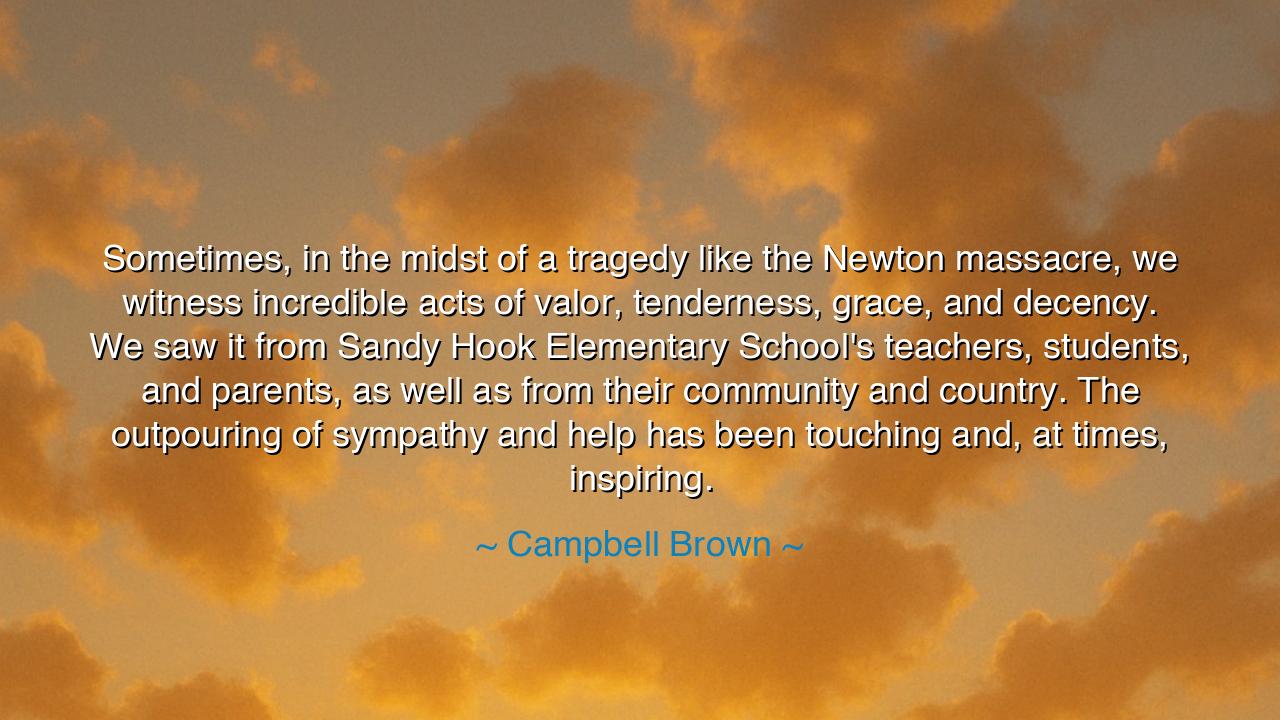
Sometimes, in the midst of a tragedy like the Newton massacre
Sometimes, in the midst of a tragedy like the Newton massacre, we witness incredible acts of valor, tenderness, grace, and decency. We saw it from Sandy Hook Elementary School's teachers, students, and parents, as well as from their community and country. The outpouring of sympathy and help has been touching and, at times, inspiring.






Hear the solemn words of Campbell Brown, spoken in the shadow of sorrow: “Sometimes, in the midst of a tragedy like the Newton massacre, we witness incredible acts of valor, tenderness, grace, and decency. We saw it from Sandy Hook Elementary School's teachers, students, and parents, as well as from their community and country. The outpouring of sympathy and help has been touching and, at times, inspiring.” These words were born of grief, but also of light—the light that flickers even in the darkest hour, when the cruelty of one act is met by the unshakable compassion of many.
The meaning of this saying rests in the paradox of human nature. In the face of tragedy, when cruelty and violence threaten to strip the world of hope, humanity often reveals its noblest qualities. In Newtown, when children’s lives were stolen in the massacre at Sandy Hook Elementary, despair fell heavy upon the land. And yet, amidst that horror, there arose acts of valor, as teachers shielded their students; acts of tenderness, as neighbors embraced one another; acts of grace, as the nation mourned together; and acts of decency, as countless strangers offered comfort and aid. Tragedy laid bare what is terrible in the human heart, but it also revealed what is most beautiful.
The ancients, too, spoke of this duality. When Troy fell beneath the spears of the Greeks, the city’s walls echoed with grief and destruction. Yet within that ruin, the poet sings of Aeneas, who carried his father on his back and led his son by the hand—a vision of duty and love rising from the ashes of despair. So too does Campbell Brown remind us that even in Newtown, though death struck mercilessly, the outpouring of sympathy became a flame against the darkness, proving that kindness endures even in the face of cruelty.
History gives us another witness in the days after the September 11 attacks. As towers fell and fear threatened to consume a nation, firefighters, police officers, and ordinary citizens became heroes. The world saw men and women rushing into flames, not away from them, and strangers comforting strangers in grief. Out of horror came a flood of help and sympathy that bound together a wounded people. This is the truth Brown speaks: that the measure of a community, a nation, and a people is not only in their triumphs, but in their capacity to answer tragedy with grace.
The lesson for us is that we cannot stop tragedy from entering the world, for evil and suffering are as ancient as time itself. But we can choose how we respond. We may allow tragedy to break us into despair, or we may rise with decency and compassion, answering cruelty with courage, and darkness with light. In the end, our response becomes the truer story—more enduring than the violence itself. For the memory of Sandy Hook is not only of loss, but of the boundless love that was shown in its wake.
Practical action follows: when tragedy strikes—whether in your community, your nation, or even in the life of a single neighbor—be among those who answer with sympathy and help. Offer your time, your resources, your listening ear, your prayers, or your hands. Do not think your offering too small; in the flood of compassion, every drop matters. And when fear tempts you to turn away, remember the example of those teachers and parents of Sandy Hook, who stood firm in the storm with valor and tenderness.
So let Campbell Brown’s words endure as a reminder. In every tragedy, there lies an opportunity to reveal the best of what it means to be human. The massacre at Newtown tore open the heart of a nation, but it also revealed a people capable of grace, unity, and love. May we, in our own day, carry forward that same spirit, so that when darkness comes—and it will come—we shall not be found idle, but shall rise as lights in the night, answering sorrow with sympathy, and despair with hope.






AAdministratorAdministrator
Welcome, honored guests. Please leave a comment, we will respond soon